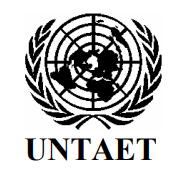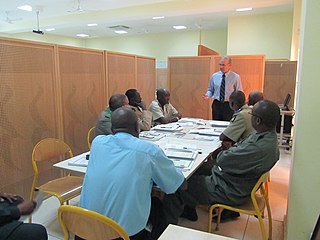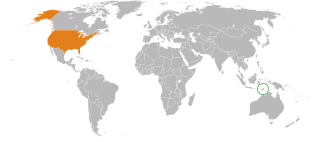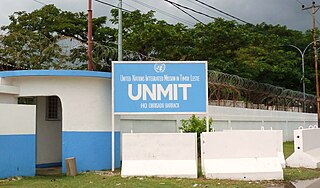 |
|---|
| Constitution |
| |
Timor Leste, since its creation in 1999, has received aid from many different parts of the International Community to help stabilise this new country. Despite this international support, East Timor still has stability issues.
 |
|---|
| Constitution |
| |
Timor Leste, since its creation in 1999, has received aid from many different parts of the International Community to help stabilise this new country. Despite this international support, East Timor still has stability issues.
After the East Timor Special Autonomy Referendum, the United Nations Transitional Administration in East Timor administered the country to ensure the proper creation of the government. This organisation was supported by a large coalition of international troops led by Australia titled International Force for East Timor. Since then, similar coalitions of forces have had to intervene in the 2006 East Timorese crisis in Operation Astute.
The United Nations Integrated Mission in Timor-Leste, initially mandated to run through 2008 [1] was extended twice, first through 2009 [2] then 2010. [3]
Part of the program was a program to support the Government of Timor-Leste (GOTL) to enhance democratic governance and facilitate political dialogue. [1] The presidential and parliamentary electoral support programs included technical and logistical support and electoral policy advice and verification. [1] One of the more significant programs was the presence of 1,635 UN police officers for elections. [1]

East Timor experienced extreme food shortages in November 2007. [4] The UN asked for aid from a number of international organisations. [4]
USAID began supporting the development of effective democratic electoral and political processes in Timor-Leste in 1999. [5] Between 2001 and 2008, USAID gave $2,215,997 to International Foundation for Electoral Systems(IFES), $3,619,134 to the International Republican Institute(IRI), and $3,728,490 to the National Democratic Institute(NDI). [5] This money supported IFES in developing electoral framework and process, IRI in developing political parties, and NDI on increasing citizen participation and local governance. [5]

The United Nations Transitional Administration in East Timor (UNTAET),, was a United Nations mission in East Timor that aimed to solve the decades-long East Timorese crisis in the area occupied by Indonesian military. UNTAET provided an interim civil administration and a peacekeeping mission in the territory of East Timor, from its establishment on 25 October 1999, until its independence on 20 May 2002, following the outcome of the East Timor Special Autonomy Referendum. The transitional administration was established by United Nations Security Council Resolution 1272 in 1999.

The International Republican Institute (IRI) is an American nonprofit organization founded in 1983 and funded and supported by the United States federal government. Most of its board is drawn from the Republican Party. Its public mission is to advance freedom and democracy worldwide by helping political parties to become more issue-based and responsive, assisting citizens to participate in government planning, and working to increase the role of marginalized groups in the political process, including women and youth. It has been repeatedly accused of foreign interference and has been implicated in the 2004 Haitian coup d'état. It was initially known as the National Republican Institute for International Affairs.
The International Foundation for Electoral Systems (IFES) is an international, non-profit organisation founded in 1987. Based in Arlington, Virginia, United States, the organization assists and supports elections and electoral stakeholders. Since 1987, IFES has worked in 145 countries and has programs in more than 50 countries throughout Asia-Pacific, Africa, Eurasia, the Middle East, and North Africa, and the Americas.

The Independent High Electoral Commission is Iraq's electoral commission. The electoral commission is headed by a nine-member board. Seven of those members are voting and must be Iraqi citizens. The IHEC is currently headed by Judge Jalil Adnan Khalaf.

The National Democratic Institute (NDI) is a non-profit American non-governmental organization whose stated mission is to "support and strengthen democratic institutions worldwide through citizen participation, openness and accountability". It is funded primarily by the United States and other Western governments, by major corporations and by nonprofits like the Open Society Foundations.
Shaun McNally is an American activist and former Connecticut state legislator. He served in the Connecticut House of Representatives from 1987–1992, representing Norwich and Sprague.

The United Nations Integrated Mission in East Timor (UNMIT) was established on 25 August 2006 by UN Security Council Resolution 1704. Its objectives are "to support the Government in consolidating stability, enhancing a culture of democratic governance, and facilitating political dialogue among Timorese stakeholders, in their efforts to bring about a process of national reconciliation and to foster social cohesion". In its most recent resolution on UNMIT, the Council extended its mandate until 26 February 2012. UNMIT and ISF troops left the country at the end of 2012.

Democracy promotion, also referred to as democracy building, can be domestic policy to increase the quality of already existing democracy or a strand of foreign policy adopted by governments and international organizations that seek to support the spread of democracy as a system of government. In practice, it entails consolidating and building democratic institutions

In the years after the September 11, 2001 attack on the World Trade Center in New York City, Yemen became a key site for U.S. intelligence gathering and drone attacks on Al-Qaeda. According to the 2012 U.S. Global Leadership Report, 18% of Yemenis approved of U.S. leadership, with 59% disapproving and 23% uncertain. According to a February 2015 report from the Congressional Research Service, U.S. officials considered Al-Qaeda in the Arab Peninsula the Al-Qaeda affiliate "most likely to attempt transnational attacks against the United States."

East Timor–United States relations refer to the bilateral relations between East Timor and the United States.
The Elections Reform Support Group (ERSG) was a forum of donors co-chaired by the United States and the European Union to coordinate the reform of the Palestinian electoral system. ESRG was founded in 2002. Members include the states of Denmark, Germany, Greece, Ireland, Italy, Japan, the Netherlands, Norway, Spain, Sweden, the United Kingdom, and the United States. Also international organizations such as the European Commission, the office of the European Union Presidency, the United Nations and the United Nations Development Program participate in this program. International Foundation for Electoral Systems supported the forum in secretarial role.
The Electoral Institute for Sustainable Democracy in Africa, or EISA, is an organization founded in 1996 in Johannesburg to "promote credible elections, participatory democracy, human rights culture and the strengthening of governance institutions for the consolidation of democracy in Africa."
The International Foundation for Electoral Systems (IFES) operates a number of election support missions in Asia. Following their elections plus approach, IFES has participated in a diverse number of programs, both enhancing the governmental organizations that directly enhance elections and enhancing civil society through the endorsement of non-governmental organizations.
Pakistan receives foreign aid from several countries and international organizations.

Democracy promotion by the United States aims to encourage governmental and non-governmental actors to pursue political reforms that will lead ultimately to democratic governance.

United Nations Security Council resolution 1599, adopted unanimously on 28 April 2005, after reaffirming previous resolutions on East Timor (Timor-Leste), particularly resolutions 1543 (2004) and 1573 (2004), the council established the United Nations Office in Timor-Leste (UNOTIL) to follow on from the United Nations Mission of Support to East Timor (UNMISET) as a special political mission for one year until 20 May 2006.

United Nations Security Council Resolution 1969 was adopted unanimously on February 24, 2011; after reaffirming resolutions 1599 (2005), 1677 (2006), 1690 (2006), 1703 (2006), 1704 (2006), 1745 (2007), 1802 (2008), 1867 (2009) and 1912 (2010) on the situation in East Timor (Timor-Leste), the Council decided to extend the mandate of the United Nations Integrated Mission in Timor-Leste (UNMIT) for a year, until February 26, 2012.

East Timor is a multiparty parliamentary republic with a population of approximately 1.1 million, sharing the island of Timor with Indonesia's East Nusa Tenggara province. During the 24 years of Indonesian occupation and after the 1999 independence referendum, pro Indonesian militias committed many human rights violations. The country gained independence in 2002, and free and fair elections were held in 2007. The United Nations Integrated Mission in East Timor (UNMIT) and the International Stabilization Force remain in the country while it develops its own security forces, the National Police (PNTL) and Defence Forces (F-FDTL).
United Nations Security Council Resolution 1867 was unanimously adopted on 26 February 2009.
Eric Bjornlund is an American expert in democratization assistance and election observation and co-founder and president of Democracy International and the author of Beyond Free and Fair: Monitoring Elections and Building Democracy. Bjornlund is also a lawyer and adjunct professor at Georgetown University.